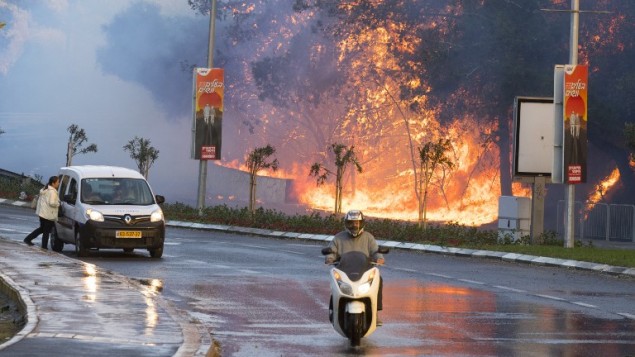
Fires in Haifa lead to evacuation of a quarter of the city’s residents on November 24. Photo by Jack Guez/AFP
Thursday November 24, numerous wildfires swept through the country. Early in the morning I heard that 220 fires had already broken out. Many of them were suspected arson. Our Arab neighbors were busy destroying our land. By mid morning it seemed obvious that these were not wildfires started by carelessly discarded cigarettes.
It had all started on Tuesday near Zichron Yaakov, a large town in the north near the coast. It took fire crews two days to put it out, but new fires broke out in the area in the following days. Thirty houses were damaged by the fires; twenty of them are now uninhabitable. Zichron, as it is often called, was founded in 1882, and has many historical buildings, as well as two fascinating museums. One of its main streets is a pedestrian mall lined with attractive shops and lovely restaurants. It’s sad to think of the devastation the fire caused there.
The situation worsened as the week progressed. We hadn’t had significant rain yet this winter and the land is parched; trees and brush are dry and catch fire easily. This week’s unusually windy condition exacerbated the problem. When talking about the fires, many of people expressed the opinion that the fires being battled all over the country had to have been arson. How else do you explain six fires breaking out in the outskirts of Haifa almost simultaneously with each other? One of the fires started next to the main fire station in the city!
Early Thursday afternoon, Haifa University was evacuated; by evening 75,000 people had fled the flames. That’s a quarter of the city’s population.
Photo of Haifa fire from Video Khabar TV
The photos were frightening. Flames and smoke surrounded tall buildings on the hilltops. I saw a friend turn white when she received a call from her husband, who works in Haifa. The police wouldn’t let anyone go home because it was too dangerous for them to leave the building. By the time residents were allowed to return to their homes Friday afternoon, 600 homes had been damaged or destroyed. 1600 people are now homeless. Although, thank God, no one was killed, about 40 people were hospitalized.
In the Binyamin area, north of Jerusalem, the town of Dolev was in danger. The residential treatment center and school for girls was evacuated. The area around Halamish (Neve Tzuf) was also on fire. Eventually about forty houses there were destroyed or damaged before the fires were extinguished. That’s a significant amount of damage in a community of approximately 350 families.
Friday evening, four fires started around Moshav Beit Meir, a small farming community about ten km west of Jerusalem. The fire that almost blocked the single road to the community was particularly frightening for those trying to escape the fire. Yoram Raanan, an artist who is a resident of Beit Meir, lost hundreds of paintings worth over a million dollars, when his studio burned t the ground.
After Losing Life’s Work in Fires, Israeli Artist Vows to Keep Painting
The scale of the fires is hard to imagine. The statistics are large numbers. They seem even larger when you take in mind that Israel is smaller than the state of New Jersey. The flames consumed tens of thousands of acres of hand-planted forests. The loss of wildlife cannot even be estimated.
Overall, in the space of one week, firefighters worked to put out 1,773 fires around the country. Thirty-nine of the fires are considered major, because ten or more teams of firefighters were required to extinguish them. Israeli crews were assisted by crews from both near (Jordan, Greece) and far (Russia, the US), from those who are our friends (Cyprus, Canada) and those who officially disapprove of Israel (Palestine, Turkey).
The most important statistic of all is a miracle: no one was killed by the flames.
This week, the arson investigations began. So far, investigators have ruled that twenty of the fires were due to arson, while some other fires were due to accidents or other causes. It will probably be months before the investigations are completed.
Israelis reacted the way we do to any crisis. We offered our homes to complete strangers, and took food and water to fire fighters. We prayed and recited Psalms, and we collected blankets and toys for displaced children.
And now the rebuilding and the replanting begins.